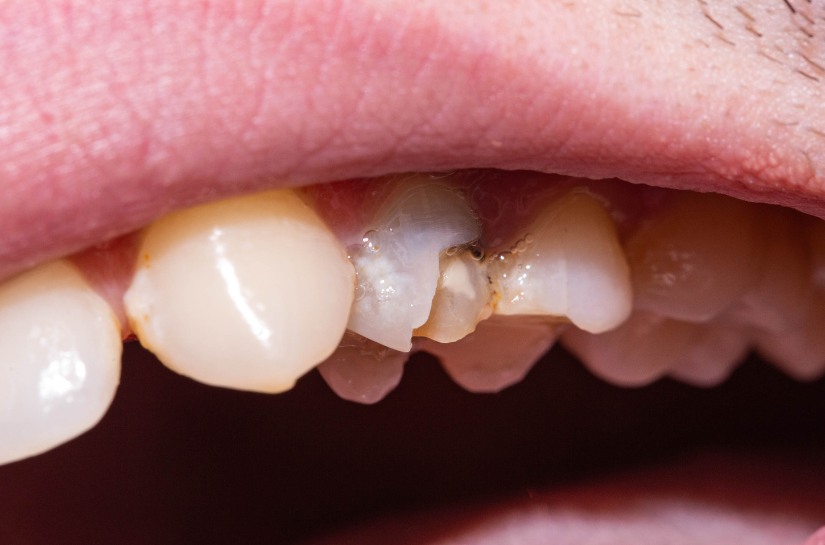1001 W Indiantown Rd, Ste 106, Jupiter, FL 33458
Is a Black Tooth an Emergency?

Introduction
A healthy smile is often associated with bright, white teeth. So, it’s natural to be concerned if you notice a tooth turning black. While a black tooth doesn’t always signal a dental emergency, it’s crucial to understand the underlying causes and potential risks. This article explores the reasons behind a black tooth, the signs and symptoms to watch for, and when seeking immediate dental care becomes necessary.
Definition of Black Tooth
A black tooth shouldn’t be ignored. Normally ranging from white to light yellow, teeth turn black due to a variety of reasons, often signaling underlying dental issues. Decay, trauma, or even health conditions can cause this discoloration. Early detection is key, as a black tooth could indicate problems that require prompt attention from a dentist.
Common Causes of a Black Tooth
- Poor oral hygiene leading to tooth decay
- Trauma or injury to the tooth
- Smoking or tobacco use
- Consuming dark-colored foods or drinks in excess
Importance of Addressing Dental Health Concerns Promptly
Ignoring dental problems, like a black tooth, is like leaving a small crack in your windshield unaddressed. While it might seem insignificant at first, over time that crack can spread, potentially leading to a shattered windshield and a much more expensive repair. The same goes for your teeth. Prompt attention to a black tooth can prevent a cascade of complications, saving you time, money, and discomfort in the long run.
Here’s why addressing dental concerns early is crucial:
- Minimizes Pain and Discomfort: Early intervention can often address the issue before it progresses to a painful stage, requiring more complex procedures.
- Preserves Your Smile: Timely treatment can prevent tooth loss and the need for replacements like dentures or implants.
- Protects Overall Health: Oral health is linked to overall health. Untreated dental problems can increase the risk of infections spreading throughout the body.
- Saves Money: Early detection and treatment are generally less expensive than addressing advanced stages of dental problems.
By prioritizing your oral health and seeking prompt treatment for concerns like a black tooth, you’re investing in a healthy smile and overall well-being.
Signs and Symptoms
Identifying the signs and symptoms associated with a black tooth can help you take prompt action to address the issue before it worsens.
- Pain and Discomfort Associated with a Black Tooth: Experiencing pain or discomfort in the affected tooth can indicate underlying decay or infection that requires treatment. Ignoring this symptom can lead to further complications.
- Changes in Tooth Color and Texture: Observing changes in the color or texture of your tooth, such as darkening or roughness, may signal the presence of dental issues that need professional intervention.
- Bleeding Gums and Bad Breath: Black teeth can also be accompanied by bleeding gums and bad breath, indicating gum disease or decay. These symptoms should not be ignored and require dental evaluation.
Potential Risks and Complications
Understanding the potential risks and complications associated with a black tooth is crucial to taking appropriate action to prevent further harm to your dental health.
- Infection Spreading to Surrounding Teeth and Gums: If left untreated, an infected black tooth can spread bacteria to surrounding teeth and gums, leading to more extensive oral health issues.
- Risk of Abscess Formation: A black tooth with an untreated infection can result in the formation of an abscess, causing intense pain and potentially requiring emergency dental care.
- Impact on Overall Oral Health and Well-being: Neglecting a black tooth can have a significant impact on your overall oral health and well-being, affecting your ability to eat, speak, and maintain a confident smile.
When to Seek Immediate Dental Care
Certain situations require immediate dental care to address a black tooth effectively and prevent complications from arising.
- Severe Pain or Swelling: If you experience severe pain or swelling in the affected tooth or surrounding area, seek urgent dental attention to diagnose and treat the underlying cause.
- Sudden Onset of Black Tooth without Trauma: A sudden change in tooth color to black without any trauma or injury should raise concerns and prompt you to schedule a dental evaluation to determine the cause.
- Difficulty Eating or Speaking Due to Tooth Discoloration: Difficulty eating or speaking due to a black tooth can impact your daily activities and quality of life, necessitating professional dental care to restore oral function.
Treatment Options
When facing a black tooth, exploring suitable treatment options with your dentist is essential to address the underlying issue and restore your dental health.
Professional Teeth Cleaning and Polishing
Professional teeth cleaning and polishing can help remove surface stains and tartar buildup, improving the appearance of your teeth and addressing minor discoloration.
Root Canal Therapy or Dental Crown Placement
For more severe cases of a black tooth caused by infection or decay, root canal therapy or dental crown placement may be necessary to save the tooth and prevent further damage.
Tooth Extraction as a Last Resort
In cases where a black tooth is severely damaged and cannot be saved, tooth extraction may be recommended to prevent the spread of infection and maintain oral health.
Conclusion
Maintaining good oral health is essential for your overall well-being. Regular dental check-ups, prompt treatment for dental emergencies, and practicing proper oral hygiene can help you achieve a healthy and confident smile.


